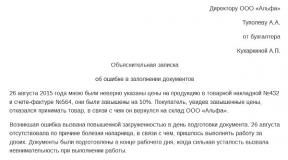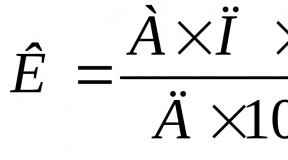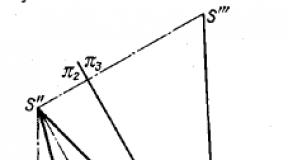State assistance to people with disabilities since childhood. All about the benefits for applicants when entering a university Benefits for a child with a disability when entering an institute
Higher education in Russia is not compulsory, but it remains largely free, and every year hundreds of thousands of people apply for university admission. Laws Russian Federation provide benefits for enrolling in institutes and universities for socially unprotected groups of citizens and some other segments of the country's population. As part of the article, we will consider who is eligible for preferential admission to a university.
Table of contents:What benefits are provided for admission to a university
The standard procedure for enrolling students in a higher educational institution provides that a citizen must apply for a desire to enroll in a certain specialty, and the result of enrollment depends on the number of points scored in the Unified State Exam in the required subjects (in some cases it is necessary to pass additional exams). After submitting the original certificate between applicants, a dispute begins for budget places at the university. At the same time, there are minimum passing scores for a specialty in a particular higher educational institution.
Benefits for admission to a university can be presented in one of three options:
- Enrollment without the need to pass exams and participate in the competition for budget places;
- Enrollment on the rights of the allocated quota. In such a situation, the student must score the minimum required score to pass to the specialty;
- Enrollment with an advantage over other students. That is, with an equal number of points for a beneficiary and another applicant, a beneficiary will be enrolled in the university.
Important:"Medalists" of schools do not have the right to preferential admission to higher educational institutions of the Russian Federation.
Benefit for admission to a university without exams

The right to enter a higher education institution without the need to pass entrance examinations and pass on a general competitive basis can be applied only at one institute or university. When submitting applications to several institutions, you need to decide in which of them it will be applied by providing it with documents confirming the benefit.
Without passing the entrance exams to the university, you can enter:
- World Champions or European Champions;
- Winners of the Olympic, Paralympic or Deaflympics;
- Citizens who have won prizes in the Olympics at the international or all-Russian level.
It is important to note that applicants have the right to enter without exams if there is a benefit only for the specialty that is relevant for them in accordance with the benefit. For example, if an applicant is the winner of an international physics olympiad, he will not be able to enroll without exams for a history teacher and other specialties where physics is not a major subject.
Benefit for admission to a university by quota
 Every year, universities and institutes determine the quota for citizens who are eligible to enroll with the minimum required number of points. The number of places for such applicants must be at least 10% of the total number of students at the faculty. The number of allocated places is determined on the basis of funds received by the university from the budget of the Russian Federation. Money can be allocated not only by the Ministry of Education, but also by the subject or municipality where the university is located.
Every year, universities and institutes determine the quota for citizens who are eligible to enroll with the minimum required number of points. The number of places for such applicants must be at least 10% of the total number of students at the faculty. The number of allocated places is determined on the basis of funds received by the university from the budget of the Russian Federation. Money can be allocated not only by the Ministry of Education, but also by the subject or municipality where the university is located.
They have the right to enter the preferential places allocated according to the quota. The benefit is available for disabled children, disabled children, disabled people of 1-2 groups or citizens who received a disability during the hostilities. Such applicants must score the minimum passing score required for admission to the chosen specialty.
Priority right when entering a university
If several citizens apply for one place at the university at once, the advantage will be given to the applicant who, when submitting the application, provided certificates of the benefit he has. These applicants include:

Note: Children have a preferential right to enter military universities if their parents have a total length of service in the armed forces of the Russian Federation for 20 years or more. Also, preferential admission is provided for children whose parents at the time of admission serve under a contract.
For those wishing to enter higher educational institutions, some innovations have appeared - the rules for enrollment have changed. Consider what benefits are provided to orphans and the disabled when entering universities.
According to the legislative framework of the Russian Federation, there are 4 types of privileges for the privileged category of applicants:
- The right to enter universities without passing exams (out of competition).
- Enrollment in state-funded places in order to obtain a bachelor's or specialist's degree within the established quota (in this case, it is necessary to obtain positive scores for entrance exams).
- Enrollment in preparatory studies at universities, which increases the chances of enrolling in a particular educational institution (this privilege can only be used once).
- Obtaining an advantage when enrolling in a university or institute (works when two applicants, among whom there is a beneficiary, score an equal number of points. In this situation, the beneficiary receives the advantage). This right applies to all preferential categories.
Types of privileges for orphans
The Law of the Russian Federation "On Education" states that orphans have the right to enroll in universities out of competition if they have a positive mark for entrance exams. This right is given within the quota established in each higher education institution. In accordance with it, 10% of budget places are allocated from the total.
Another benefit provided to orphans when entering universities, institutes and academies is enrollment in the training departments at higher educational institutions (without passing exams) and free education at these departments (now there are not so many of them - they work in about 60 Russian universities) . Thus, applicants in the future get more chances to enter on a general basis. Until 2014, inclusive, this type of benefit was the only one for orphans. Today you can choose either preparatory education, or preferential enrollment within a special 10 percent quota for budget places.
According to the current version of the law on education orphans can use the right to enroll under a special quota until January 1, 2021. It is possible that in the future the state will not refuse to support applicants left without parents, and the benefit will be extended.
Features of the introductory campaign for the disabled
 Benefits for disabled people when entering a university are the same as for orphans. The applicant can choose either to study at the training department, or preferential admission according to the quota. The rule remains the same - the applicant must pass the exams for a positive assessment. The number of places for people with disabilities is 2-3% of all preferential places.
Benefits for disabled people when entering a university are the same as for orphans. The applicant can choose either to study at the training department, or preferential admission according to the quota. The rule remains the same - the applicant must pass the exams for a positive assessment. The number of places for people with disabilities is 2-3% of all preferential places.
In the case of people with disabilities, there are some nuances of filing documents. First, the prospective student must provide a certificate medical and social expertise that studying in a higher educational institution is not contraindicated for him. Secondly, when passing the entrance exam for this category of applicants, additional time is allocated, but not more than 1.5 hours.
Benefits for admission to a higher educational institution are provided for by law:
- for people with I and II disability groups;
- for disabled children;
- for people with disabilities since childhood;
- for war invalids, as well as those who became them after an injury or illness received during military service.
Documents required upon admission
Recall that you can apply on a preferential basis only to one educational institution and only to one specialty. If the applicant has a desire to try his hand at other universities, then the benefits for admission in this case are no longer valid.
Among the documents that must be provided to the beneficiary upon admission to the university, there must be:
- a statement of a certain type;
- the passport;
- a document on completed secondary education (if there is no original, then a certified copy can be dispensed with);
- documents giving the right to out-of-competition enrollment:
- for the disabled - a certificate of medical and social expertise, which confirms the disability and the opportunity to study at a university;
- for orphans - a certificate from the relevant authorities confirming their status;
- certificate with the results of the exam;
- Some photos.
Thus, the state is concerned that all citizens of Russia have the opportunity to receive higher education regardless of social status and health status.
However, it is important to remember that the entrance exams to a higher educational institution take into account many of the benefits that an applicant has.
To make it easier for yourself to enter and increase your chances of becoming a freshman, it is important to be aware of such “subsidies” and use them wisely for their intended purpose.
Main types
The legislation of the Russian Federation provides 4 types of benefits, which can be used by applicants when entering the chosen specialty at the university.
- participants of international olympiads,
- members of the Russian national teams;
- prize-winners and winners of the All-Russian Olympiad for schoolchildren;
- champions of the Paralympic and Olympic Games upon admission to the faculties of physical education.
- disabled since childhood;
- disabled people of I and II groups;
- children of disabled parents;
- other applicants who fall under the privileged category of local governments.
This right applies to such applicants:
- orphans;
- applicants up to 20 years with a disabled parent and real income below the established subsistence level;
- disabled children of the first two groups;
- war invalids and participants in the database;
- participants Chernobyl disaster and their children;
- children of fallen heroes of the USSR and holders of the Order of Glory;
- children of military personnel who died or were injured in the performance of their duties (there are several preferential categories for military personnel);
- military under contract after three years of military service.
- children of all categories of military personnel who died in the service;
- entrants involved in the preparatory courses of this university;
- military children who were dismissed from the army for health reasons with a predominant experience of 20 years.
Separately, it is worth clarifying the situation with the military. 
So, the right to preferential education at the university have:
- children of prosecutors who were injured or died in the service;
- children of internal affairs officers who also died or are incapacitated in connection with the performance of their direct duties.
Military personnel of the Ministry of Internal Affairs of the Russian Federation can also enter on preferential terms.
How to get a?
As you know, an applicant can enter several universities at once, trying their luck in different specialties.
That's just to take advantage of the benefits for admission and further education in a higher educational institution can only once.
That is why it is necessary to decide in advance who to become in the future, and not be tormented by doubts already at the time of the entrance exams.
The beneficiary, like other applicants, must provide the selection committee standard package of documents which includes: 
- USE certificate;
- the passport;
- Photo;
- standardized statement.
Additionally, you must attach evidence of preferential income.
For the disabled, this is the conclusion of the VKK with a specific diagnosis, for the children of military personnel - a certificate from the work of the deceased parent; for children with a disabled parent - medical confirmation of the disease of an adult.
If the beneficiary did not find his name in the list of those enrolled in the first year and does not agree with such a decision, then he must file a written complaint with the administration of the university.
You can also send your solicitation about finding out the reasons for not entering the Department of Education or the Ministry of Education.
If justice is not achieved in these instances, the applicant has the right to draw up a statement of claim against the university and submit it to the court for further proceedings.
As the practice of many years shows, the leadership of all universities of the Russian Federation always meets preferential categories of applicants and, as a rule, such graduates do not have problems with admission.
Law changes
The legislation of the Russian Federation provides a number of changes, which concerns the admission of preferential categories of applicants: 
- As mentioned above, in order to receive an admission benefit, an applicant must choose only one specialty. Previously, the benefits were extended to three specialties at once, so now the conditions for admission have become more stringent.
- Applicants can apply for admission directly to 5 higher educational institutions, but only one university can use the right of preferential admission, upon presentation of the relevant documents, of course.
- To date, state-funded places have also appeared in commercial universities, so preferential categories of applicants can also apply for them and try to enter.
Such minor innovations somewhat changed the rules for entering a university, but at the same time did not infringe on the rights of preferential categories of applicants for further higher education.
Now the applicant needs to quickly decide who he wants to become.
You should definitely take advantage of this opportunity, it is possible that it will provide a bright future and the proud title of “young specialist”.



















